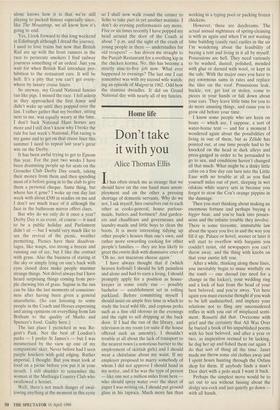Home life
Don't take it with you
Alice Thomas Ellis
I have always thought that if (which heaven forfend) I should be left penniless and alone and had to earn a living, I should promptly apply for a position as house- keeper in some easily run — possibly bachelor — establishment Set in rolling parkland. Before committing myself I should insist on ample free time in which to study the local wild life, and copious perks such as a fine old oloroso in the evenings and the right to sell dripping at the back door. If I had the run of the library, and television in my room (or suite if the house offered such an amenity), I shouldn't trouble at all about the lack of transport to the nearest town (a notorious barrier to the employment of skittish girls) and I should wear a chatelaine about my waist. If my employer proposed to marry somebody of whom I did not approve I should hand in my notice, and if he was the type of person — like one not a million miles from here who should spray water over the sheet of paper I was writing on, I should put ground glass in his tapioca. Much more fun than working in a typing pool or packing frozen chickens.
However, these are daydreams. The actual annual nightmare of spring-cleaning is with us again and when I'm not wasting time building (easily run) castles in the air I'm wondering about the feasibility of buying a tent and living in it all by myself. Possessions are hell. They need variously to be washed, dusted, polished, mended with glue or darned with wool, or kept in the safe. With the major ones you have to pay enormous sums in rates and replace the tiles on the roof. Possessions leak, buckle, rot, get lost or stolen, come to pieces in your hands or fall down about your ears. They leave little time for you to do more amusing things, and cause you to grow old before your time.
I know some people who are keen on boats — which are, I suppose, a sort of water-borne tent — and for a moment I wondered again about the possibilities of living in one of them, but as Wide has pointed out, at one time people had to be knocked on the head in dark alleys and press-ganged in order to be persuaded to go to sea, and conditions haven't changed all that much. What might be a dinky little cabin on a fine day can turn into the Little Ease with no trouble at all as you find yourself miles out of port, sleeping in wet oilskins while scurvy sets in because you forgot to stow the Cox's orange pippins in the dunnage.
Then you start thinking about making an enormous fortune and perhaps buying a bigger boat, and you're back into posses- sions and the infinite trouble they involve. There is some tiresome, immutable law about the space you live in and the way you fill it up. Palace or hovel, sooner or later it will start to overflow with bargains you couldn't resist, old newspapers you can't throw away, and the thing with knobs on that your auntie left you.
After a while, thinking along these lines, you inevitably begin to muse wistfully on the tomb — one shroud (no need for a change in the locker), your wedding ring and a lock of hair from the head of your best beloved, and you're away. Yet here again you must exercise thought if you wish to be left undisturbed, and implore your relations not to fling any unconsidered trifles in with you out of misplaced senti- ment. Rossetti did that. Overcome with grief and the certainty that All Was Over he buried a book of his unpublished poems with his best beloved, and after a year or two, as inspiration seemed to be lacking, he dug her up and fished them out again. I do that sort of thing all the time. Janet made me throw some old clothes away and I spent hours hunting through the Oxfam shop for them. If anybody finds a man's Dior shirt with a polo neck I want it back.
Perhaps the simplest move would be to set out to sea without fussing about the dodgy sea-cock and just quietly go down with all hands.






























































 Previous page
Previous page